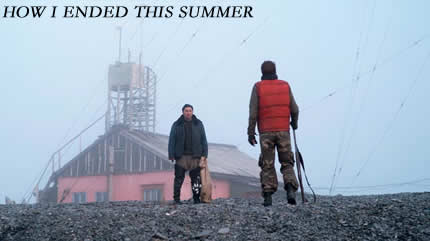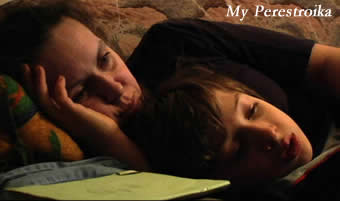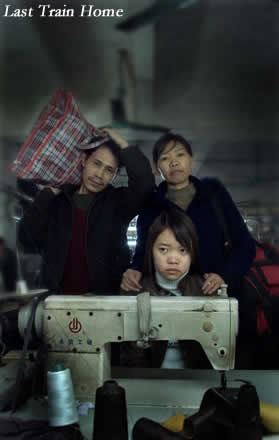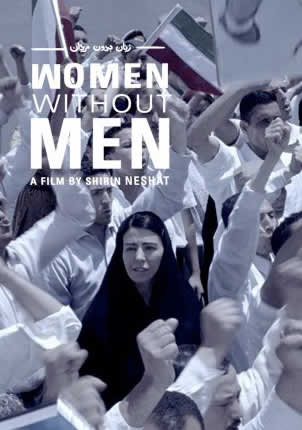 Already in its 39th year, NEW DIRECTORS NEW FILMS is firmly established in the annual NY Film Festival calendar.
Already in its 39th year, NEW DIRECTORS NEW FILMS is firmly established in the annual NY Film Festival calendar.
Jointly selected and presented by the Film Society of Lincoln Center and the Museum of Modern Art, it’s an annual showcase of noteworthy films –documentaries and fiction—by emerging filmmakers from around the world. This year’s edition features twenty-seven highlights from the past festival season, including this year’s Sundance and Berlin Film Festival.
the past festival season, including this year’s Sundance and Berlin Film Festival.
Fresh from its world premiere at the Berlinale, HOW I ENDED THIS SUMMER (KAL YA PROVYOL ETIM LETOM, 2010) comes Russian filmmaker Alexei Popogrebsky’s follow up to his 2003 festival favorite, KOKTEBEL, a collaboration with Boris Khlebnikov.
For years, middle aged family man Sergei (Sergei Poskepalis) has been working on a meteorological station on a remote island in the Arctic sea. He is joined by Pavel, (Girgory Dobrygin) a young colleague. Day in, day out they follow a routine, taking turns in recording data and delivering their reports to the main land.
Pavel is a restless guy all into new technologies, whereas Sergei is content and set in his ways and the tension between the two is palatable. Pavel just seems to be counting the days until he can leave the island – and Sergei looks forward to a brief visit with his wife and young son.
One day, headquarters orders Pavel to deliver some devastating news to Sergie.. Worried and scared to tip off the delicate balance between them, Pavels withholds the information, until it finally spills out of him – leading the two protagonists to spiral deeper and deeper into darker and darker places of their souls. The strong and convincing performances by Poskepalis and Dobrygin, combined with the ruthless yet ravishing climate and landscape, provide this minimalist movie with a cinematic and emotional richness that is haunting and touching at the same time. The cinematography, as well as both actors, were awarded with Silver Bears at this year’s Berlinale.
 Staying in Russia—but moving from the deserted landscape of the Arctic Sea to the bustling city of Moscow—is Robin Hessman’s documentary MY PERESTROIKA (2010).
Staying in Russia—but moving from the deserted landscape of the Arctic Sea to the bustling city of Moscow—is Robin Hessman’s documentary MY PERESTROIKA (2010).
Many years in the making, this film follows four forty-something friends and their families as they reflect, reminisce, yet never romanticize growing up in the Soviet Union and their current life in Putin’s new Russia. Filled with plenty of home video footage that elegantly bridges the past with the present, Hessman’s protagonists gently guide us through the historical changes of the Soviet Union—and make the far away Russia seem very close to home.
Another documentary that opens up doors and allows us to peek into a far-away place is Chinese-Canadian filmmaker Lixin Fan’s LAST TRAIN HOME (2009), awarded with Best Feature length documentary at last year’s IDFA and also screening at this year’s edition of Sundance.
Over the course of a few years, the filmmaker follows the Zhang couple as they travel from the city of Guangzhou, where they work, and the village of Huilong, their home more than 50 hours away, by train. Like endless other migrant workers in the Republic of China, the Zhangs left their home many years ago in  order to work in the big cities and provide a better life for their children and parents. Having been away for too many years, the Zhang couple never got a chance at parenting; so each visit with their children is loaded with tension and pressure. Their discussions always return to the children having to do well in school and working hard for a better life than their parents. Guilt, fear, pressure, tension and the inability to communicate with their children are captured in a painfully-clear fashion. However, once the Zhang couple learn that their oldest daughter Qin has quit school and moved to the city to become a migrant worker herself, their attempts to make her change her mind are touching and devastating at the same time. What we may regard as normal teenage rebellion becomes a life determining decision. With LAST TRAIN HOME, Fan has made a sensitive, yet uncompromisingly dramatic documentary that questions the desire to aspire to a better life.
order to work in the big cities and provide a better life for their children and parents. Having been away for too many years, the Zhang couple never got a chance at parenting; so each visit with their children is loaded with tension and pressure. Their discussions always return to the children having to do well in school and working hard for a better life than their parents. Guilt, fear, pressure, tension and the inability to communicate with their children are captured in a painfully-clear fashion. However, once the Zhang couple learn that their oldest daughter Qin has quit school and moved to the city to become a migrant worker herself, their attempts to make her change her mind are touching and devastating at the same time. What we may regard as normal teenage rebellion becomes a life determining decision. With LAST TRAIN HOME, Fan has made a sensitive, yet uncompromisingly dramatic documentary that questions the desire to aspire to a better life.
Moving from China to Italy, from reality to fiction, from deprivation to abundance—yet staying with the themes of family, the inability to communicate, and searching for a better life is I AM LOVE (IO SONO L’AMORE, 2009) by Italian writer-director Luca Guadagnino. His debut feature started its successful festival run in 2009, playing at the Toronto and Venice Film Festival and continued into 2010 with screenings at Sundance and Berlin. Now it’s hitting NDNF in New York before being theatrically released by Magnolia Pictures later this summer.
The enigmatic and always mesmerizing Tilda Swinton is Emma, a Russian transplant married into a rich patriarchy family business loaded with money, traditions and plenty of skeletons in the closet that no one ever talks about. After her children have left home and she has dutifully fulfilled her role as wife and mother, Emma starts to wonder what else life may have to offer but beautiful clothes, lavish dinner parties and the occasional counseling of her children. Sure enough, there is more love, lust and living to be done— but not within this family. With its elegant sets, costumes and delicious dishes, Guandagnio’s film crawls underneath the superficial decorum to explore the emptiness and stasis of this dolce vita.
Strong women trying to escape their confined places in society and life are featured in Sharin Neshat’s first fiction film WOMEN WITHOUT MEN. The Iranian Neshat is best known for her poetic and politically charged black and white photography and video installations reflecting on the role of women in Islamic societies. WOMEN WITHOUT MEN, based on Shahrnush Parsipur’s book with the same title, centers around the same theme.
Set in 1953 Iran (just prior to the coup d’etat which overthrew the democratically elected government and brought the Shah into power for the next 25 years) Neshat’s episodic film follows the fates of four women in  Tehran, all ready for a change in their lives. Fakhri (Arita Shahrzad), a middle aged, westernized woman decides to leave her husband to live her own life. Zarin (Orsi Toth), a young prostitute, loathes her low life and escapes the city. Munis (Shabnam Tolouei), a single woman, becomes politically aware and turns into an activist as well as fighting an arranged-marriage. Her best friend Faezeh (Arita Shahrzad) initially seems content with her traditional role, but slowly starts to question her long held values.
Tehran, all ready for a change in their lives. Fakhri (Arita Shahrzad), a middle aged, westernized woman decides to leave her husband to live her own life. Zarin (Orsi Toth), a young prostitute, loathes her low life and escapes the city. Munis (Shabnam Tolouei), a single woman, becomes politically aware and turns into an activist as well as fighting an arranged-marriage. Her best friend Faezeh (Arita Shahrzad) initially seems content with her traditional role, but slowly starts to question her long held values.
All of characters meet at Fakhir’s orchard outside the city where, for a brief moment, they all find peace with themselves. But soon enough, society and history catch up with them. Slow paced and packed with impressive imagery, Neshat’s film has an intensity and immediacy that suggests what could have been in—and should have been in—Iranian society then and now. WOMEN WITHOUT MEN won the prestigious director award at last year’s Venice Film Festival and will be theatrically released in the US by INDIEPIX.
Another episodic film is Eric Mendelsohn’s 3 BACKYARDS, which was given the directing award at this year’s Sundance Film Festival. Three stories from one suburban town are told side-by-side—never colliding, never merging and never exploding either. The film is quiet yet powerful with its very own drama and urgency. Chrissy (Rachel Resheff), a dreamy schoolgirl, accidentally takes her mother’s bracelet to school, loses it, and has to reclaim it before dinnertime; John (Elias Koteas), a middle-aged father, husband and businessman about to leave on a business trip, is grounded. But instead of returning home, he wanders around his home town, re-examining life. Peggy (Edie Falco), a housewife, mother and hobby painter, eagerly agrees to drive her guest-neighbor, a well known actress (Embeth Davidtz), to the ferry, hoping to make a new friend and add some excitement to her daily life. John’s story takes up the most screen time and Koteas gives his John a quiet forcefulness that makes one wonder: Did he just lose his job? Is he sick? Is he cheating on his wife? Is he suicidal? Will he get on this plane, never to return home again? Beneath the surface of these seemingly simple stories appear to be bigger issues, and Mendelsohn gives plenty of time and space for contemplation.
This is but a limited selection from the rich program. For more information please visit: www.newdirectors.org

